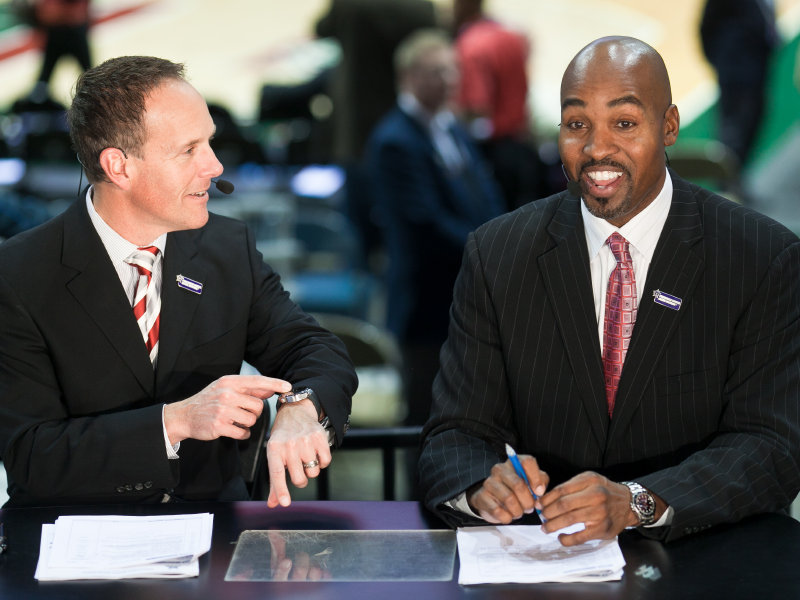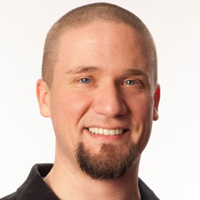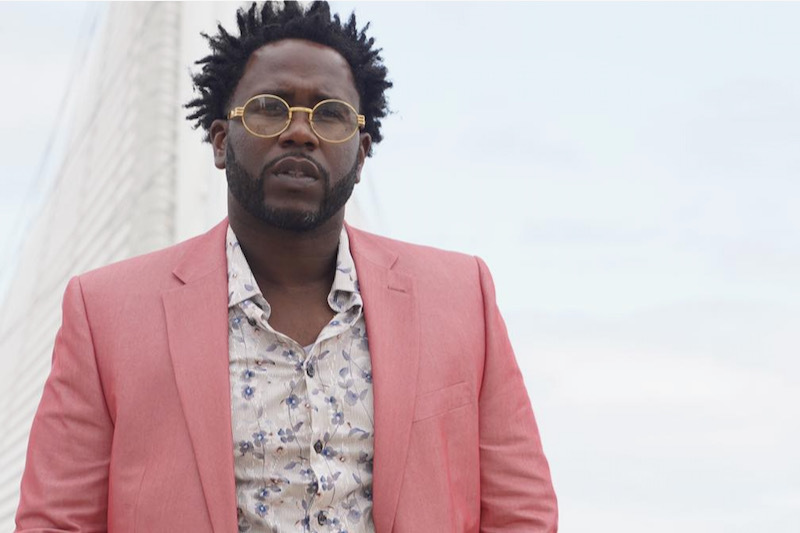Tony Smith has been a fixture on the Milwaukee basketball scene since he starred at Wauwatosa East High School. He then became an All-American at Marquette University before going on to play in the NBA and overseas.
He is currently a Bucks analyst for FOX Sports Wisconsin, and he sat down with OnMilwaukee.com before a recent Bucks game for this installment of Milwaukee Talks.
OnMilwaukee.com: This is your fifth year analyzing games with FOX Sports Wisconsin, but this is the first time you’ve filled in for color man Jon McGlocklin during games. What’s that been like?
Tony Smith: A little bit different. Everything is obviously a learning situation. Doing pre and post (game), you kind of figure what’s going to be important in the game, or what you think is going to be important and you talk about that. Post is obviously dictated by what happens in the game, so those two are kind of simple, no brainers. But then you get into the game and it’s totally different. You have to talk about what goes on as it’s going on so it’s a little bit different. The good thing is it’s all still basketball, so as long as you know your stuff.
I think sometimes people think you gotta know a lot of stuff, you have to keep a lot of stats in your head. I don’t. I’m the worst at stats. I can’t remember any stats. If you asked me right now I can’t remember who won the last three championships in the league. I just don’t remember stuff like that. But, I don’t have to. I just need to talk about what’s going on in the game right now, situations that are in hand, some strategies that might be implemented in certain situations, personnel, stuff like that. It’s fun. Getting in there with the legendary Jim Paschke. Obviously Paschke’s been around forever and that’s kind of cool too.
OMC: Is that more difficult, having to analyze live and in the moment?
TS: What’s crazy is live TV is much easier than taped. Because tape, you feel like if you screw up you have a chance to do it over. So now you’re thinking about what you’re saying as opposed to when you’re live you’re calculating and re-calculating in your head before it comes out of your mouth. When you’re taping you're saying whatever and it’s like ‘Oh, I don’t like that, let’s do it again.’ Live is a little bit easier for me.
OMC: You’re from the Milwaukee area, went to Marquette, but then set off on a professional basketball career that took you all over the world. How nice has it been that you’ve been able to return and kind of re-plant here?
TS: Even when I played I always came back here in the summer. The only time I was away from here was when I was married for a few years and I was out in L.A. full time. Other than that I’ve always been in Milwaukee. I like Milwaukee. I’m a Milwaukee guy. I was born and raised here, obviously Marquette. I love Milwaukee, especially in the summer. All I do is play golf. It’s great for that. I don’t know, I’m just a Milwaukee guy.
OMC: Speaking of Marquette – have you been able to watch them at all this year?
TS: No! I’m so upset about my Marquette following right now. I haven’t been able to follow much because I’m so entangled with all this stuff. The real problem I have is coming down to the (BMO Harris) Bradley Center too much. They have a lot of double headers where they do Marquette in the afternoon and the Bucks at night and there’s no way I can be down here all day long. I just can’t. Especially with this schedule. And now that I’m filling in these few games I’m traveling too so it’s twice as bad. So when you get back you’ve got to get some rest. Even on my off days, I’m planning to do other stuff, which is really a bad move. You have to relax on your off days. You really can’t have too much going on. A lot of times I will plan stuff in the mornings or afternoons of game days because I figure I’m busy all day anyway I might as well do this and when I have an actual off day I don’t have to do anything.
OMC: So you really haven’t been able to connect with this recent run for Marquette?
TS: I would say I follow them from afar. That’s what it’s been so far. I wish I could follow them more. I watch them on TV when I can, catch ‘em there. I really have not been around the team as much as I would want to. I’ve seen (coach) Buzz (Williams) at a few games here – that’s the most I’ve talked to him – when he comes to (Bucks) games here.
OMC: Is it strange to see the guys you went head-to-head against on the court in the 1990s as often as you do now off the court?
TS: I guess you always see players still around the game. Obviously the great players, the guys you’re talking about, Michael (Jordan) has his ownership (of the Charlotte Bobcats). Charles is doing TV. Magic is doing TV. All those guys are still around the game. Why wouldn’t they be around? They were great players, they have a lot of knowledge so people are trying to get that out of them in some capacity, whatever it may be. I’m not surprised to see guys around. As they come here to the Bradley Center I see a lot of guys that were not such big name stars coaching, doing conditioning, they’re assistants and involved with teams in one way or another, even TV-wise.
OMC: I know some of them, like Jordan and Barkley, are a few years older than you, but is it strange to see so much coverage of their 50th birthdays and all of the retrospective pieces on TV – like when Magic Johnson announced his retirement from a Lakers team you were on due to the HIV virus – and know that you lived it?
TS: So you’re saying I’m old that’s what you’re saying? You’re right – I am old – but …
At this point, the "Czar of the Telestrator" Mike Fratello, who coached in the NBA for 17 years, came over to say hello to Smith and talk about the Bucks’ overtime loss to the Brooklyn Nets in New York on Feb. 19. The two analysts discussed the final play of regulation when Nets guard Joe Johnson hit a 3-pointer at the buzzer, talking about the strategy of fouling immediately with six seconds left in regulation (Too much time left to do so at that point, according to Fratello), fouling with three seconds, and whether there was some confusion on the Bucks’ part leading to Johnson’s relatively clean look.
The two finished the conversation, and Smith finished up his thought.
I don’t even think twice about it. It was the 90s, which was a while go, like when people looked back at the 80s. I didn’t even think twice about it until you brought it up!
OMC: Turning our attention to this current Bucks squad, they’re desperately trying to make the Eastern Conference playoffs. Not many players on this team have that experience, or much of it. You played nearly 30 playoff games in your career with three different teams – is there something to 'just making' the playoffs and learning something from it?
TS: Getting into the playoffs, just being in that atmosphere, obviously that’s something to learn from. There’s no doubt about that. But, you don’t want to consistently ‘just’ get to the playoffs. The reason you want to ‘just’ make it for certain teams is some teams who are right there on the bubble, they haven’t made it yet, or are on the upswing, you’re an up-and-coming team, that’s fine. You get in the first round, you get bumped, knocked off by the No. 1 seed, whatever, that’s the way it is, but you learned something. You learned how that No. 1 seed played in the playoffs and you see the guys because it’s a totally different intensity.
It’s more about every possession, it’s more about two minutes left in the entire game, that’s more of the feeling you get, the intensity out there. Every possession is important. Everything is just heightened that much more.
OMC: Speaking of playoffs and what you can learn, your rookie year you were on a Lakers team that lost to the Chicago Bulls in the NBA Finals in 1991. Now, no one knew Magic was going to retire after that, but that team wasn’t that old. Did you think ‘This is L.A., this is what we do’ and you’d be back often?
TS: Obviously, me as a rookie thought that, but guys were telling me ‘Hey man, you’re lucky. You got here your first year because it’s hard to get here.’ Obviously I found out it’s not easy to get back. It’s the same thing I told Devin Harris when he was with Dallas (when they went to the Finals in 2006), take advantage of it because it’s not easy. He was doing the same thing. He was on a good team, thinking they were going to get back, same thing. It’s just not automatic for a lot of teams. If you get your team to stay together you have a good shot. The San Antonios, the Chicagos, the teams like that. Now, Miami. Those teams get back a few times in your career, but not everybody can do that.
OMC: Looking back, that year is sort of marked as the 'end of Showtime' in L.A. What was that year like for you playing with Lakers legends Magic, Byron Scott and James Worthy?
TS: Your rookie year you don’t know jack. You don’t know much. You kind of think you know some stuff but you really don’t. You’re in there, having fun, seeing all these people you used to watch on TV last year and you want to get in there and measure yourself. It was a fun time, a competitive time. Depending how you played ... I was behind a superstar at my position – both positions really with Byron and Magic – so me looking that I was going to get a lot of time was not realistic. But, I’m still going to work hard and do the right things. Those guys were veteran guys who were teaching you the right things to do, which is good. A lot of players don’t have the benefit of good, veteran guys who are ahead of them or teaching them. Sometimes you get guys ahead of you who are just worried about themselves or not interested trying to help you out. But, for the most part in the league, most guys are pretty good with helping the young guys out.
OMC: You played all over the world – Europe, the United States, the Dominican Republic. Is there a place where you can say ‘Wow, that place was awesome. I loved playing there?’
TS: You know, the venues in the states, as far as the NBA, most of them are just – as far as madness goes – on a scale of one to 10, most of them are probably around a six. If you get a tight game or a big game, obviously with the Lakers those were always big games in most cities when we came into the arena and it might amp up to a seven. But it just wasn’t a crazy atmosphere just because the NBA clientele is not … crazy. They’re kind of business people, take clients to the games, having their beer.
Overseas, it’s more of a college atmosphere. People are there simply to cheer on their team. They don’t care who the other team is. They could be playing Nobody State and they’re going to be out in droves supporting their team. They’re going to be acting crazy, screaming and yelling and that’s what they do. Overseas might be even more intense than college. The fans over there absolutely bonkers. They go crazy. First of all, they’re much smaller arenas and they are jam-packed. People are throwing things. It’s a totally different atmosphere. Totally different. You can’t even imagine over there. It’s crazy. It’s just like the soccer games. And imagine that in a smaller arena. It’s crazy over there.
OMC: You retired in 2000 and returned to Marquette to finish up your degree a few years later, at which point you did some broadcasting on Time Warner. Did you plan ahead, or know, that you wanted to get into broadcasting?
TS: I had no idea, no intention of doing anything. I was talking to Dennis Krause about doing some of the Roundtable shows, that’s how that all started. I was doing Roundtable shows, talking about some topics, talking about Marquette, Bucks, things like that. Then he said ‘Hey, do you want to do some high school games?’ and I started doing that. That’s where it all started from. Then my buddy Scott Williams who was doing this job (for FOX Sports Wisconsin) before me let me know that he was going to be going back to Phoenix and said maybe you want to check with these guys to see if you could take my spot. That’s how I got in.
It’s been great. Definitely I’ve been blessed. Obviously I had to work hard for some things but overall I’ve been blessed with a lot of things. I remember growing up I always went to the Mecca as a kid watching the Bucks play and even when they moved here (to the BMO Harris Bradley Center) and I was at Marquette I’d go to Bucks games with friends.
I’ve always watched the Bucks. I remember when (Bucks assistant) Sidney (Moncrief) was playing, coming down with buddies and being up in the rafters because that’s all we could afford. It was good. If you’re a basketball fan, you’re a basketball fan and if this is the team in your city you root for your team in your city. So, I went from that, on to high school playing, doing your own thing, Marquette. I love Milwaukee. I’ve been around here a long time, I’ve got a ton of friends in the city and people everywhere. It’s kind of good for me. Just being people around you know you can trust. If you go somewhere else you don’t really know anybody so it’s good. It’s a feel-good environment around here.
Jim Owczarski is an award-winning sports journalist and comes to Milwaukee by way of the Chicago Sun-Times Media Network.
A three-year Wisconsin resident who has considered Milwaukee a second home for the better part of seven years, he brings to the market experience covering nearly all major and college sports.
To this point in his career, he has been awarded six national Associated Press Sports Editors awards for investigative reporting, feature writing, breaking news and projects. He is also a four-time nominee for the prestigious Peter J. Lisagor Awards for Exemplary Journalism, presented by the Chicago Headline Club, and is a two-time winner for Best Sports Story. He has also won numerous other Illinois Press Association, Illinois Associated Press and Northern Illinois Newspaper Association awards.
Jim's career started in earnest as a North Central College (Naperville, Ill.) senior in 2002 when he received a Richter Fellowship to cover the Chicago White Sox in spring training. He was hired by the Naperville Sun in 2003 and moved on to the Aurora Beacon News in 2007 before joining OnMilwaukee.com.
In that time, he has covered the events, news and personalities that make up the PGA Tour, LPGA Tour, Major League Baseball, the National Football League, the National Hockey League, NCAA football, baseball and men's and women's basketball as well as boxing, mixed martial arts and various U.S. Olympic teams.
Golf aficionados who venture into Illinois have also read Jim in GOLF Chicago Magazine as well as the Chicago District Golfer and Illinois Golfer magazines.




.jpg)


